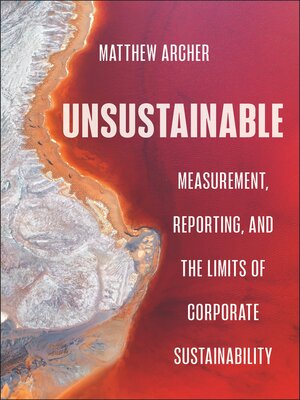Unsustainable
ebook ∣ Measurement, Reporting, and the Limits of Corporate Sustainability
By Matthew Archer

Sign up to save your library
With an OverDrive account, you can save your favorite libraries for at-a-glance information about availability. Find out more about OverDrive accounts.
Find this title in Libby, the library reading app by OverDrive.



Search for a digital library with this title
Title found at these libraries:
| Library Name | Distance |
|---|---|
| Loading... |
A behind-the-scenes look at how corporate and financial actors enforce a business-friendly approach to global sustainability
In recent years, companies have felt the pressure to be transparent about their environmental impact. Large documents containing summaries of yearly emissions rates, carbon output, and utilized resources are shared on companies' social media pages, websites, and employee briefings in a bid for public confidence in corporate responsibility.
And yet, Matthew Archer argues, these metrics are often just hollow symbols. Unsustainable contends with the world of big banks and multinational corporations, where sustainability begins and ends with measuring and reporting. Drawing on five years of research among sustainability professionals in the US and Europe, Unsustainable shows how this depoliticizing tendency to frame sustainability as a technical issue enhances and obscures corporate power while doing little, if anything, to address the root causes of the climate crisis and issues of social inequality. Through this obsession with metrics and indicators, the adage that you can't manage what you can't measure transforms into a belief that once you've measured social and environmental impacts, the market will simply manage them for you.
The book draws on diverse sources of evidence—ethnographic fieldwork among a wide array of sustainability professionals, interviews with private bankers, and apocalyptic science fiction—and features analyses of name-brand companies including Volkswagen, Unilever, and Nestlé. Making the case for the limits of measuring and reporting, Archer seeks to mobilize alternative approaches. Through an intersectional lens incorporating Black and Indigenous theories of knowledge, power and value, he offers a vision of sustainability that aims to be more effective and more socially and ecologically just.







